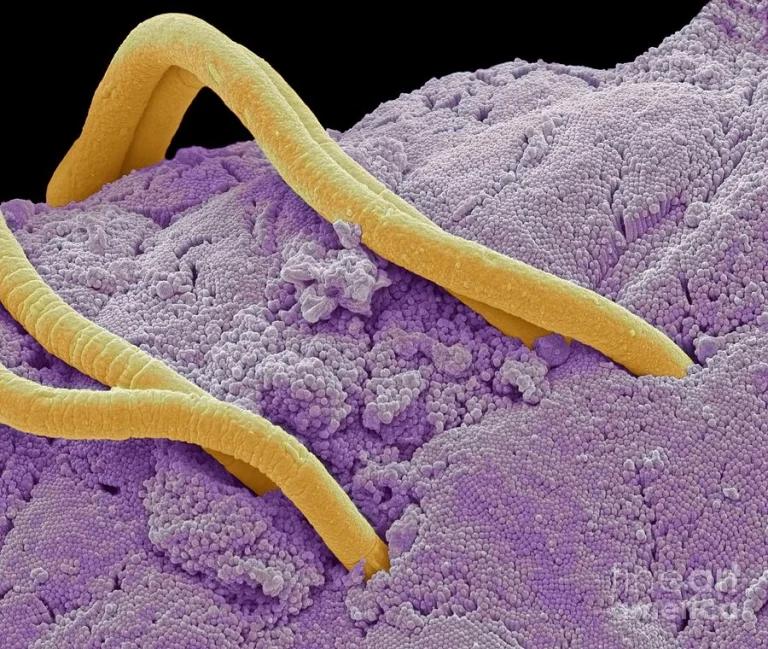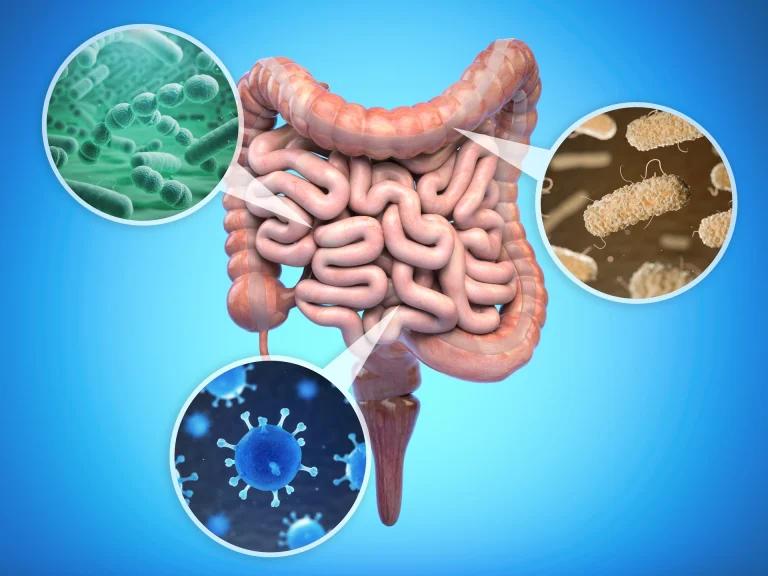Threadworms, also called pinworms are the most common type of worm infection in the UK. They appear to look like pieces of white thread, with adult male threadworms measuring 2–5 mm in length, and adult female threadworms measuring 8–13 mm. They are mainly found in children but adults can also suffer from them too, through their spread through family groups, people living in institutions, attending school or nursery. Humans are thought to be the only host. Let’s take a deeper look into the ways humans get threadworms.
⭕ The life cycle of threadworms
Threadworms known by their scientific name Enterobius vermicularis live in the gut for about 5-6 weeks and then die. Before death, the female worms lay tiny eggs which hatch in the small intestine. The threadworm grows and moves on to the large intestine. After a few weeks, the female pinworms move to the end of the large intestine where they come out of the body at night to lay their eggs around the anal area. The eggs irritate the skin in this area causing an itchy bottom often at night during sleeping. This results in eggs getting under the nails and onto the fingers and then being swallowed. Any eggs that are swallowed then hatch and grow into adult worms in the gut. Therefore, a cycle of threadworm infection can go on and on.
📝 Ways in which you can get threadworm
- The most common way people get threadworms is by swallowing the worm’s eggs
- Threadworms leave your gut at night and lay eggs on the skin around your anus (bottom). The eggs can get onto your hands or under your fingernails by scratching the itchy area or because of poor handwashing after using the toilet
- Eggs can be passed on to an uninfected person e.g. through food handling, touching kitchen and bathroom surfaces or toothbrushes
- Threadworm eggs can also get onto carpets, bed linen, towels, soft toys, flannels and into household dust and, in this way, they are passed from person to person
- It may be between 2 and 6 weeks after contact with a source of infection before the life cycle is complete and eggs are laid in the newly infected person
🩺 Symptoms of threadworm
The most common symptom people with threadworms will have is an intense itchy bottom, particularly at night.
Threadworms may be visible on your bedsheets or clothes, or you may notice them in your poo (faeces). They appear like thin, white, cotton threads.
Stomach pain, nausea and loss of appetite are less common symptoms, but can happen if there are many threadworms in the intestines.
Symptoms that need more investigation by a healthcare professional include:
- Loss of appetite
- Weight loss
- Bedwetting
- Skin infections around the anus caused by scratching
🧪 Diagnosis of threadworm
Diagnosis of threadworms is usually based on clinical history. Parents can be asked to perform the sticky tape test on their child’s bottom if there is any doubt. This simple test involves applying a transparent piece of tape around the anus and catching any worms that come out to lay eggs. The tape can then be taken to the doctor for diagnosis.
💊 Treatment for threadworms
Mebendazole is an over-the-counter treatment for threadworms. This is usually a chewable tablet or liquid you swallow.
It belongs to a group of drugs called anthelmintics. Anthelmintics paralyse the parasite by binding to its nerve and muscle cells, which disrupts glucose transport by cells. These sugars are essential to their survival, therefore this disruption stops the worms from staying alive. Within a few days, this leads to the death of the worms. Once dead, the worms are then removed from the body by passing through the gut into the stools. Threadworm symptoms may still be experienced for a couple of days until the worms begin to die.
This treatment of threadworms only kills the adult worms and not their eggs, so it’s important to treat all family members. During or after treatment it is important to maintain strict hygiene standards to avoid any new eggs which can cause a new infection.
Always seek medical advice from a healthcare professional if you need to treat a child under 2 years old, or if you’re pregnant or breastfeeding.
❗How to prevent threadworm re-infection
The NHS suggest some of the following good hygiene measures to minimise re-infection.
Good personal hygiene
- Wash hands and scrub under fingernails – particularly before eating, after using the toilet or changing nappies
- Encourage your children to wash their hands regularly
- Wash every morning
- Rinse toothbrushes before using them and cover the bristles with a cap
- Keep fingernails short
- Encourage family members in the household to wear underwear at night and change it in the morning
Good home/kitchen hygiene
- Thoroughly wash garden-grown fruit and vegetables
- Wash sleepwear, sheets, towels and soft toys on a high-temperature setting
- Vacuum and dust with a damp cloth
- Disinfect kitchen and bathroom surfaces regularly with hot water
📝 Conclusion
Threadworms are contagious but not harmful. You may not notice you have them until they become itchy. Strict hygiene measures can help clear up a threadworm infection and reduce the likelihood of reinfection. With the simple steps listed above you can keep the threadworms away!
Sources
- Threadworm | Health topics A to Z – CKS – NICE
- Pinworms (Threadworms): Symptoms, How You Get Them & Treatment
- Worms in humans – NHS
- Threadworms – NHS
- Enterobius Vermicularis – StatPearls – NCBI Bookshelf
Medical Disclaimer
NowPatient has taken all reasonable steps to ensure that all material is factually accurate, complete, and current. However, the knowledge and experience of a qualified healthcare professional should always be sought after instead of using the information on this page. Before taking any drug, you should always speak to your doctor or another qualified healthcare provider.
The information provided here about medications is subject to change and is not meant to include all uses, precautions, warnings, directions, drug interactions, allergic reactions, or negative effects. The absence of warnings or other information for a particular medication does not imply that the medication or medication combination is appropriate for all patients or for all possible purposes.









